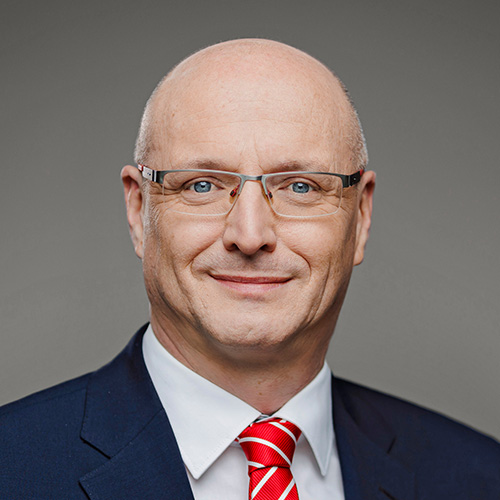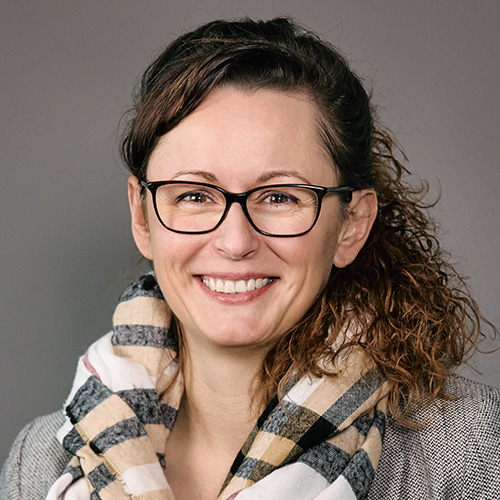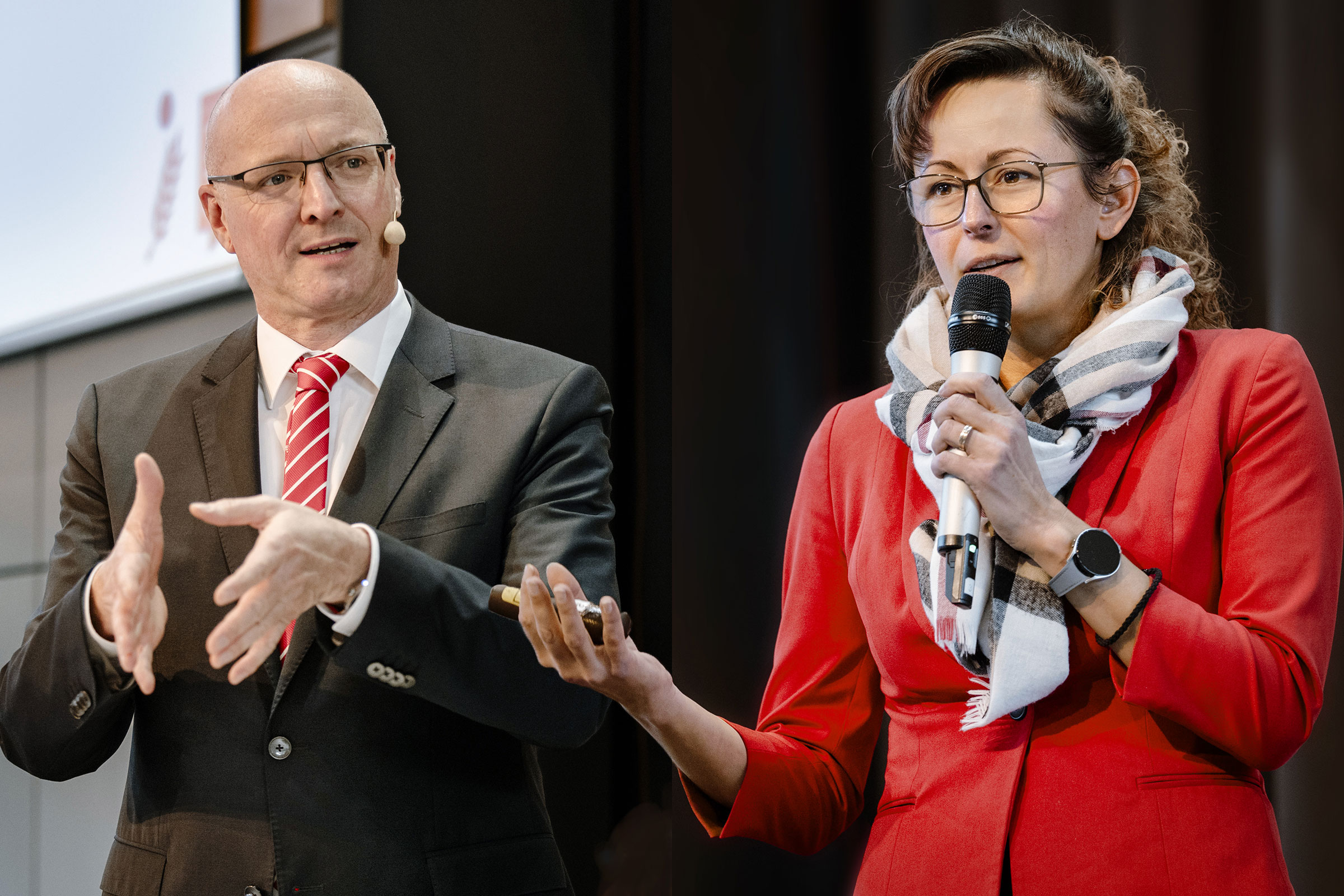The Executive President of the East German Savings Banks Association (OSV), Ludger Weskamp, and Brandenburg’s Minister of Agriculture, Hanka Mittelstädt, both have strong regional and practical ties. Ludger Weskamp was previously a district administrator, while Hanka Mittelstädt was most recently the managing director of an agricultural business and previously also worked as a banker. Both are therefore well placed to comment on the special economic and political conditions in the OSV’s business area.
Mr Weskamp, the world is in turmoil and Germany is also facing major economic challenges. What does the current situation mean for the Savings Banks in eastern Germany?
Ludger Weskamp: To use a popular German farming expression, in recent years federal subsidy policy has often given the impression of “jumping in and out of the potato field” – or of chopping and changing. This is fatal. Reliability, predictability and the ability to plan are essential in almost all areas of life – especially for our farmers. The economic situation is and will remain tense in the coming months. For our eastern German Savings Banks, this could mean stricter lending conditions, increased uncertainty for investments and even stronger competition from other financial service providers. Eastern German Savings Banks must respond flexibly and innovatively to ensure their stability. But they have been doing this for more than 200 years.
In addition, the new federal government took office in the spring of this year. I hope that the current mood of change does not fizzle out. We must now move from talk to action and all pull together. I am optimistic that the German engine will then start up again.
Agriculture is an important economic sector in eastern Germany. How are eastern German farms faring?
Weskamp: Fifty years ago, there were more than 1.1 million farms in the Federal Republic of Germany. Today, there are only around 260,000 nationwide – the most productive of which are in eastern Germany, which is why they receive the largest share of agricultural subsidies from Brussels. In the four federal states of Brandenburg, Mecklenburg-Western Pomerania, Saxony and Saxony-Anhalt, more than 120,000 people work in around 21,000 agricultural businesses. Agriculture is one of the most important economic sectors in eastern Germany. The eastern German Savings Banks have been intensifying their agricultural business for more than a decade. During this period, they have more than doubled the volume of loans in this market segment. Where other banks are pulling out, we are providing individual advice and support on the ground. Despite the economic uncertainties, the agricultural loan portfolio remains stable at around EUR 746 million, with only minor fluctuations.
Hanka Mittelstädt: Farms are under a great deal of pressure, especially in livestock farming. We have lost a lot of ground here in recent years. Sow farming, pig fattening and dairy farming have seen a substantial decline in Brandenburg – generally due to a lack of economic prospects. Nevertheless, I am convinced of their future viability and efficiency: highly trained agricultural managers are ready to take the future of these businesses into their own hands. The figures mentioned above show a willingness to invest. If we succeed in providing reliable framework conditions for livestock farms at EU and federal level over the next two years, I see opportunities to reverse the downward trend.
Mr Weskamp, how are the economic difficulties affecting your agricultural corporate customers on the one hand and the Savings Banks themselves on the other?
Weskamp: Farming is capital and credit-intensive, whether it’s land purchases, animal housing or technology – costs have risen massively in all areas recently. In addition, agricultural businesses are confronted with an endless array of laws and regulations, which require ongoing additional investment. Politicians need to create reliable framework conditions quickly. Securing debt servicing capacity is particularly important for agricultural businesses, especially as they often have seasonal cash flows. Maintaining liquidity throughout the year until subsidy payments or harvest revenues are actually received is a particular challenge. This is important in order to be able to cover ongoing operating and personnel costs. Forward-looking, early financial planning is therefore crucial. This is where the eastern German Savings Banks come into play as reliable local financial partners.
Where do you see the focus of your support for eastern German agriculture in the near future?
Weskamp: The East German Savings Banks Association regularly attends major agricultural trade fairs and organises two great events every year: the annual agricultural business conference and the traditional agricultural convention. Farmers value these events as a platform for exchanging ideas and networking with experts from agriculture, science and interest groups, as well as with the Savings Banks’ agricultural customer advisors on current agricultural issues.
Ms Mittelstädt, where do you see your current priorities as Minister?
Mittelstädt: I would like to focus my work strategically on developing future-oriented framework conditions. This means not just thinking in the short term, but looking beyond the current legislative period. The realignment of EU policy under the auspices of a new defence and infrastructure doctrine has already led to fundamental changes in priorities. I firmly believe that a stable, crisis-proof farming and food industry in Europe is also an integral part of European security policy. In state politics, we are working to strengthen agriculture again after overcoming the existential threat to our livestock farming posed by the outbreak of foot-and-mouth disease. Ministers of the eastern federal states are working hand in hand, as the framework conditions for our farms are similar and require a strong voice at federal level and in Brussels. Our farmers in Brandenburg are excellent business managers who innovatively meet the demands of society, changing markets and even climate change. We must free this entrepreneurial and professional excellence from excessive constraints.

»Where other banks are pulling out, we are providing individual advice and support on the ground.«
Executive President of the East German Savings Banks Association
Mr Weskamp, how are eastern German farms affected by the skills shortages and a lack of succession – and how should they be addressed?
Weskamp: No one would wish to gloss over the fact that the shortage of young talent is already putting significantly more pressure on existing staff. Many farms are also facing the serious challenge that the next generation does not want to or is unable to enter the agricultural sector. This often leads to farms being sold or abandoned. We need to get young people interested in farming again, promote training and further education opportunities, and create attractive financial conditions. In recent years, the East German Savings Banks Association has offered workshops on the shortage of skilled workers and succession as part of the agricultural convention, because the barriers to taking over farms are currently too high.
Ms Mittelstädt, how much regulation does agriculture need – and which rules tend to be more of a hindrance?
Mittelstädt: A large proportion of agricultural products are raw materials that are traded worldwide and across Europe, mostly for further processing into food. This means that regulations have a strong influence on competitiveness with other regions. We already have such distortions of competition in Europe, one example being the high German standards in livestock farming. This has led to a significant shift in pig production to Spain. Fruit and vegetable cultivation in Germany is also suffering massively from very different wage conditions in Europe due to the high demand for seasonal workers. And we have very different rules on the approval of pesticides, regulations on fertilisation and other nature conservation restrictions. We therefore need to find a balance between necessary – but fair – regulations within Europe and the reduction of over-regulated standards. We even have problems with this in our federal structures. What a farmer is allowed to do in Bavaria may be prohibited in Brandenburg. Future regulation and deregulation must take better account of the aspect of comparable standards.
What specific steps are you planning to reduce bureaucracy?
Mittelstädt: We know that we have to cut through a lot of red tape. The first approach we are taking at state level is to review all regulations and laws that go beyond federal and EU legislation to assess their effectiveness and usefulness. It is important to have direct contact with the people affected by bureaucracy, who can explain their problems to us objectively. This takes place in regular meetings. In order to then move into an implementation phase, we have created working structures in our ministry to internalise the permanent reduction of bureaucracy, not as a threat, but as a measure of success. In the first six months of my term of office, we have already been able to contribute to the introduction of the first deregulation in the areas of land use and the environment into the parliamentary voting process – a first concrete step that we will follow up with others.
Mr Weskamp, what does your association expect from the new government, especially after the farmers’ protests in early 2024?
Weskamp: First and foremost, I would like to see farmers appreciated and acknowledged for the important role they play in regional supply and the economy. After the protests in early 2024, it is important that the government promotes dialogue with farmers in order to develop sustainable solutions together.
What framework conditions does sustainable and stable agriculture need in the future?
Weskamp: Sustainable and regional agriculture requires clear and fair legal requirements and competitive conditions that promote environmental and climate protection without jeopardising the economic existence of agricultural businesses. Financial support and long-term, unbureaucratic subsidy programmes are needed to promote sustainable farming methods and innovative technologies.
Ms Mittelstädt, you ran a farm yourself for several years. What do you think characterises a modern, sustainable agricultural business?
Mittelstädt: A willingness to innovate and entrepreneurial drive – I’m very clear on that. It doesn’t help at all to complain about the general conditions. And that actually applies to every company. Even if it can be difficult at times, action must be taken: diversifying the business, being open to market opportunities and having a little courage to experiment. I also think it’s important to be open to partnerships and cooperation. The time when we could solve all our issues on our own is over. Additional strength comes from pooling expertise and financial clout – I sometimes wish there was more openess among farm managers in this regard.
Where do you see the greatest need for political action?
Weskamp: Clearly in reducing bureaucracy and overregulation. As in all industries, these two factors stifle initiative and innovation in agriculture. The whole country is talking about digitalisation, but compared to ten years ago, companies in Germany now have to fill out almost 16 per cent more paperwork in the form of applications and invoices. And it’s the same for farmers, doctors, retailers, associations and, yes, even local government. This bureaucracy costs EUR 65 billion a year in direct costs for companies alone. Farmers want to supply us with food and other important raw materials – out in the fields, not at a desk!
Mittelstädt: Reducing bureaucracy alone will not be enough, but it is an important building block. In my view, what we need is a clear vision for agriculture in Germany in 2040. A resounding yes to restructuring livestock farming, appropriate legal certainty and a sufficient support package. A resounding yes to grassland sites and pasture farming. A resounding yes to reviewing the approval of pesticides in line with European standards, taking into account climatic changes, and a yes again to the use of innovative, environmentally friendly methods in arable farming, including natural genetic engineering.

»The ministry should play an important role as a link between the industry and the associations.«
Minister for Agriculture, Food, the Environment and Consumer Protection of the State of Brandenburg (MLEUV)
What might cooperation between the OSV Savings Banks and agriculture ministries such as the MLEUV Brandenburg look like in the future?
Weskamp: The exchange already exists. It is now important that it is actively maintained and expanded. In the case of Ms Mittelstädt, it is of course a stroke of luck that, as a former farmer, she is very close to the concerns of the farms. Together, we could develop targeted support programmes in the future to help farms with investment, modernisation and sustainable management.
Mittelstädt: My idea of cooperation is to bring together the best of all perspectives and arguments and work together to achieve results. This is where the ministry can and should play an important role as a link between the industry and the associations. Wherever we can provide impetus for future-oriented development, we will be there to give our full support.
